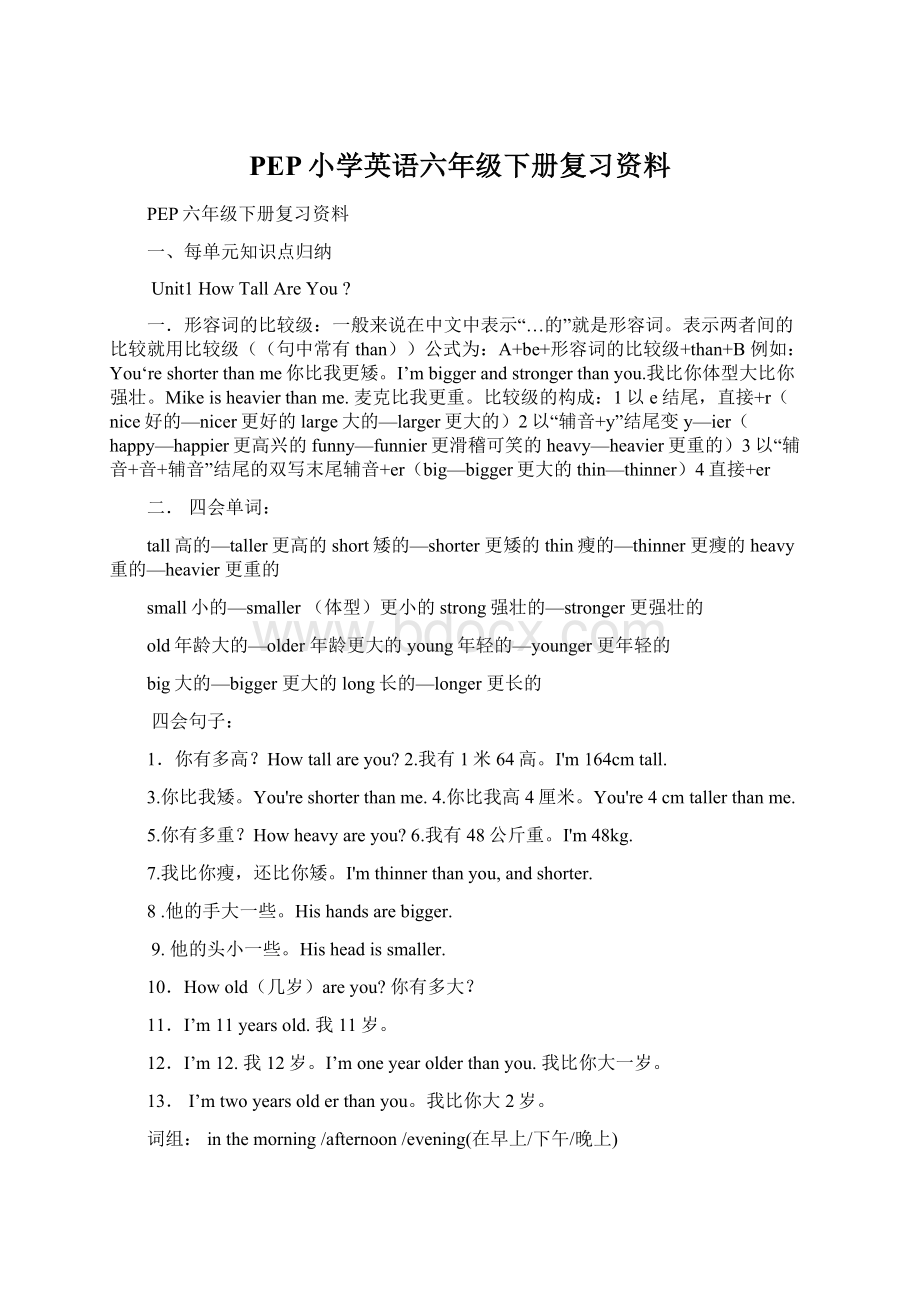PEP小学英语六年级下册复习资料Word文档格式.docx
《PEP小学英语六年级下册复习资料Word文档格式.docx》由会员分享,可在线阅读,更多相关《PEP小学英语六年级下册复习资料Word文档格式.docx(7页珍藏版)》请在冰豆网上搜索。

5.你有多重?
Howheavyareyou?
6.我有48公斤重。
m48kg.
7.我比你瘦,还比你矮。
mthinnerthanyou,andshorter.
8.他的手大一些。
Hishandsarebigger.
9.他的头小一些。
Hisheadissmaller.
10.Howold(几岁)areyou?
你有多大?
11.I’m11yearsold.我11岁。
12.I’m12.我12岁。
I’moneyearolderthanyou.我比你大一岁。
13.I’mtwoyearsolderthanyou。
我比你大2岁。
词组:
inthemorning/afternoon/evening(在早上/下午/晚上)
walkto…..步行到flew(fly)kites放风筝jumpinto(跳到…….里面)swamto……..(游到…..里面)fiveminuteslater五分钟以后
returned(return)……..to(把…..归还给别人)begratefultosb(对某人很感激)
Unit2What’stheMatter,Mike?
一.四会单词
haveafever(发烧)hurt(疼痛)haveacold(发烧)haveatoothache(牙痛)haveaheadache(头疼)nose(鼻子)haveasorethroat(喉咙痛)matter(事情麻烦)sore(疼)tired(累的)excited(兴奋的)angry(生气的)happy(高兴的)bored(无聊的)sad(伤心的)
二.四会句子
1你怎么啦?
我发烧了。
What'
sthematter?
Ihaveafever.
2我喉咙疼。
Mythroatissore.(=Ihaveasorethroat.)
3我鼻子疼。
Mynosehurts.(表示身体某一部位疼hurt+s)
4你感觉怎样?
Howdoyoufeel?
5我感觉生病了。
.Ifeelsick..6.我很高兴。
I’mhappy/Ifeelhappy.
7.Amy感觉怎样?
她很累。
HowdoesAmyfeel?
She’stired.
8你好吗,刘云?
你看上去那么高兴。
Howareyou,LiuYun?
Youlooksohappy.
9你好吗,Sarah?
你今天看上去那么伤心。
Howareyou,Sarah?
Youlooksadtoday.
10.Howareyou,LiuYun?
你好吗,刘云?
Youlooksohappy.你看起来很高兴。
11.Shefeelshappy.=Sheishappy.她很开心.
12.Ifeelhappy.=Iamhappy.我很开心.。
13.Iamgoingonabigtrip.我将去旅行
14.Ifailedmymathtest.我数学考试失败了。
15.I’msorrytohearthat.听到这个消息我感到很伤心。
16.Don’tworry别担心
17.Ifyouaresick,seethedoctor.假如你生病了,就去看医生。
18.Takesomemedicine(药)anddrinkhotdrinks.(吃些药,喝热开水。
)
Unit3andunit4
动词一般过去时表示过去发生的事情,公式是:
人+动词过去式+其他+过去的时间。
表示过去的时间是判断过去式的主要标志:
lastweekend上个星期lastyear去年lastmonth上个月yesterday昨天
例如:
Ivisitedmygrandparentslastweekend.上周末我看望了爷爷奶奶。
WuYifanplayedfootballwithhisfriendsyesterday.昨天吴一帆和他的朋友们一起踢足球。
动词过去式变化规则:
1.一般在动词末尾加-ed,如ski-skied(滑雪)relax-relaxed(放松)prepare-prepared准备
2.结尾是e加d,如:
taste-tasted(尝起来)
3.末尾只有一个元音字母和一个辅音字母的重读闭音节,应双写末尾的辅音字母,再加-ed,如:
stop-stopped(停止)
4.以“辅音字母+y”结尾的,变y为i,再加-ed,如:
study-studiedcarry--carried
直接+ed的动词过去式:
watch(watchedTV看电视)visitedtheGreatWall(参观长城)
wash—washedtheclothes洗衣服clean—cleanedtheroom打扫房间play—playedfootball踢足球playedbasketball(打篮球)
playedsports进行体育运动climb-climbedamountain爬山
visit——visitedgrandparents看望爷爷奶奶cook---cooked做饭
learn-learnedChinese/English/math学习语文/英语/数学
listen—listenedtomusic听音乐row—rowedaboat划(船)
returmsthtosb把...归还给(givesth.backtosb)returned=gave…backto把…归还给
没有规律的动词的过去式有:
do做---did(did(my我的)homeworkdidher(她的homeworkdidhis他的homeworkdidtheir(他们的)homeworkdidour(我们的)homework)read-—read(readabook=readbooks读书)go—去went(wenttoapark去公园wentswimming去游泳wentfishing去钓鱼wenthiking去郊游wentskiing去滑雪wentice-skating去滑冰wentshopping去购物
sing-sangdance–danced(sanganddanced唱歌跳舞)take–took(tookpictures拍照)eat--ate(ategoodfood吃了很多好吃的食物)buy-—bought(boughtpresents买礼物)seesaw(sawelephants/pandas看见了大象/熊猫)get–got(gotto到达)isam—was(WuYifanwasbusylastweekend.)have--had有(EverydayIhadfunwithmycousins每天我和表兄弟都过的很开心)fly飞——flew(flewkites放风筝)
swim——swam游泳study——studiedEnglish学习英语win——wonthegame赢得比赛
(Class3wonthegame3班赢得了比赛)leave——left离开(WeleftBeijingonFebruary1standgottoHarbinonthe2nd.我们二月一号离开北京二号到达哈尔滨)(Werelaxedandpreparedtogobacktoworkorschool.我们放松了一下准备回到工作和学习中)make–madeasnowman堆雪人
Unit3四会句子:
1.-——Whatdidyoudolastweekend?
上周末你干了什么?
——Ivisitedmygrandparents.我去拜访了我的爷爷奶奶。
2.——Didyoucleanyourroomyesterday?
你打扫了你的房间了吗?
——Yes,Idid。
是的,我打扫过了/No,Ididn’t.不,我没有打扫过。
3.---WhatdidMikedoyesterday?
昨天迈克+干了什么?
----Hewentswimming.他去游泳了。
4.JohnwasbusylastSunday.上个星期天John很忙碌。
5.Hewashedtheclothesandcleanedtheroominthemorning.早上他了洗衣服,打扫了教室。
Unit4四会句子:
1.Wheredidyougoonyourholiday?
你在哪儿度假了?
---IwenttoXinjiang.我去新疆了。
2.Howdidyougothere?
你是怎么去儿的?
----Iwentbytrain.我坐火车去的。
3.Whatdidyoudothere?
你在那里干吗了?
----Iwentskiing我去滑雪了。
4.Whatdidyoudoonyourholiday?
----你假期里去干吗了?
---Iboughtpresents.formyfriends.我给我的朋友买礼物了。
5.Didyoureadbooks?
你读过书吗?
--Yes,Idid.是的,我看过。
6.Didyougotoapark?
你有没有去过公园?
No,Ididn’t..不,我没有。
Did+主语+动词原形+其他成分?
用Yes,Idid.或No,Ididn’t.来回答.。
What:
什么,问事情问东西;
Why:
为什么,问原因;
Where哪里,问地点;
Who谁,问人;
Whose谁的,问主人。
Whosebookisthis?
这本书是谁的?
It’smysister’s.它是我妹妹的。
Recycle12
一般将来时表示将来某一时刻的动作或状态,常常与表示将来的时间状语连用。
其表达形式为“begoingto+动词原形”,标志性的时间词:
tomorrow,nextMonday,nextweek等。
四会句子:
Whereareyougoingonyourholiday?
假期你打算去哪里?
IamgoingtoKunming.我打算去昆明。
Whoareyougoingonwith?
你将和谁一起去?
Iamgoingwithmyparents.我将和我父母一起去。
Howareyougoingthere?
你打算怎么去?
Wearegoingbyplane.我们坐飞机去。
Whenareyougoing?
你打算什么时候去?
Wearegoingthisweekend.我们打算这个周末去。
Haveagoodtime.祝你玩得开心。
二、每单元语法
Unit1HowTallAreYou?
话题:
身体
时态:
比较级在一般现在时中的运用
句型:
1.How引导的特殊疑问句,来谈论对方的身体情况:
---How+(高、矮、胖、瘦等与身体有关的)形容词+areyou?
---I'
m+与身体有关的具体数值。
例:
A:
Howtallareyou?
B:
I'
m164cmtall.
2.比较级,用来对自己和他人的身体特征进行比较:
---Youare+形容词的比较级+thanme.---I'
m+形容词的比较级+thanyou.例:
mthinnerthanyou.
Myhandsarebiggerthanyours.
Unit2What'
stheMatter,Mike?
一般现在时
1.What引导的特殊疑问句,谈论身体上的病痛:
---What'
---My+身体器官+is/are+sore./My+身体器官+hurt/hurts./Ihavea+有关病痛的词组。
What'
sthematter,Amy?
Ihaveacold.Mynosehurts.
2.How引导的特殊疑问句,谈论人们情绪上的感受:
---Howareyou?
Youlook+与情绪有关的形容词。
---I'
m+形容词。
Howareyou,LiuYun?
Youlooksohappy.
B:
Yes.I'
mexcited.
Unit3LastWeekend
日常活动
一般过去时
1.What引导的特殊疑问句,就过去已经发生的行为动作进行提问:
---Whatdidyoudo+时间?
---I+动作(did).例:
Whatdidyoudolastweekend?
IPlayedfootball.
2.Did引导的一般疑问句,就过去是否发生了某行为动作进行问答:
---Didyou+动词原形?
---Yes,Idid.No,Ididn'
t.例:
Didyoureadbooks?
Yes,Idid.
Unit4MyHoliday
节日
综合运用Where,When,What,How等词,引导特殊疑问句,就过去已经发生的行为动作进行提问:
基本句型同上。
Wheredidyougoonyourholiday?
IwenttoXinjiang.
三、不定冠词a和an的用法
a用于辅音因素开头的单词前,an用于元音因素开头的因素前
如:
asinger,awriter,apoliceman,asalesperson
记住本学期出现过的用an的单词:
anactor,anactress,anEnglishbook,anartist,anaccountant,anengineer,anorange,anoldwoman
四、人称代词和物主代词
I(我)—my(我的)you(你)—your(你们的)we(我们)—our(我们的)
he(他)—his(他的)she(她)—her(她的)it(它)—its(它的)
they(他们,她们,它们)—their(他们的,她们的,它们的)
五、介词的用法
1.UsuallyIgotoschoolonfoot,sometimesIgobybike.
2.Waitforthesprout.Waitfortheflowertogrow.
3.Seeyouattwoo’clock.
4.Gostraightforfiveminutes.Thenturnleft.
5.Itontheleft.
6.Geton/offatthepostoffice.
六、用动词的适当形式填空
1.like或者likes后面直接跟动词的ing形式
Ilikemakingkites.Helikescollectingstamps.
2.wantto跟动词原形
IwanttobuyanEnglishbookinthebookstore.
Iwanttobeascienceteacheroneday.
3.can后跟动词原形
Shecanplaytheviolin.Icanplaybasketball.
4.begoingto后跟动词原形(不要管是什么人称)
Whatareyougoingtodoontheweekend?
Iamgoingtovisitmygrandparentsthisweekend.
Johnisgoingtobuyapairofshoesintheshoestore.
Wearegoingtohaveapicnicnextweek.
5.第三人称单数形式加s或es
(动词第三人称单数形式一般直接加s,以ch,sh,s,x,o等结尾的加es,以辅音字母加y结尾的变y为i再加es,如studies;
特殊变化have变has)
Shecleansstreets.Hehelpssickpeople.
Shereadsnewspapereveryday.HewatchesTVathome.Hegoestoworkbysubway.Heisateacher.HeteachesEnglish.MypenpallivesinBeijing.Hestudieshard.(他努力学习)
Shehasahappyfamily.(她有一个快乐的家庭)
6.肯定回答,否定回答
Isthere……?
Yes,thereis./No,thereisn’t.
Doeshe……?
Yes,hedoes./No,hedoesn’t.
Doesshe……?
Yes,shedoes./No,shedoesn’t.